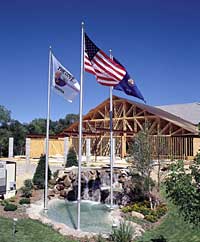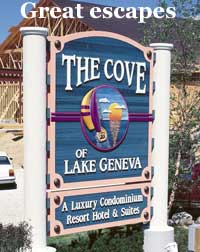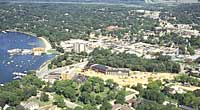Press Tour |
  |
||
SUNDAY, JUNE 25, 1995 |
|
|
Buying a second home 'should be based on the satisfaction
of |
||
First Choice for a second home is a nearby haven light years from the hassels of urban life
On Friday evenings, when they're beat from a week at work, tired of fighting the crowds, feeling frazzled and time-pressed, Karen and Mont Wickham brace themselves for one last tangle with the masses. They join the great exodus that unfolds every summer weekend on the car-clogged expressways leading out of the city. The Wickhams, and others like them, are the lucky city dwellers who can pack up and get away to their very own vacation retreat-a place seemingly light years from the hassles of urban life, but still within driving distance. Generally, people are picking second homes within a short driving distance, no more than 2 1/2 hours away, where they can take the kids or grandchildren, entertain friends, or just kick back and relax. "Vacationing patterns have changed," said Richard Ragatz, a consultant in Eugene, Ore., who studies the second-home market. "People like to go for two or three days at a time, and a vacation home nearby facilitates that process." In general, Ragatz says, the second home market has just kind of "waddled along" for years with no great peaks or valleys, although lately, close-by retreats are gaining favor. Timeshares are making a big comeback, accounting for 55 percent of all vacation home purchases in the last five years. Ragatz estimates that about 1.7 million timeshares
|
have been sold since 1978, mostly in resort destinations like coastal beaches and ski areas. When Midwesterners buy a timeshare, it's not around here. There are hardly any timeshares within a day's driving distance of Chicago. Instead, nearby second homes are bought outright. Expensive perhaps, but a fair number of Baby Boomers, empty nesters and wellheeled singles are coming up with "all cash" or making hefty down payments and borrowing the rest to buy their get-away haven. Nevertheless economics are still an important consideration. More second home buyers are opting for properties that can be rented out to help foot the monthly bills. While no one can say exactly how many locals are buying closeby refuges, there's one thing the fortunate few have in common: Water. "I wanted water," said Michael Kelly, an attorney who bought a house on a lake near Saugatuck, Mich. Big lake, small lake, river or pond-the particulars don't seem as important as the presence of an ample body of the wet stuff and maybe some sand to scrunch between the toes. According to a survey just completed by Ragatz, Midwesterners listed a lakeside spot as the most desirable location for a second home. That's probably why people here who aspire to dual residences usually head for the shores of Michigan and Indiana, or the inland lakes of Wisconsin. 
One trend making a second home purchase feasible is the emergence of the two wage-earner household. "Basically, it's more people with more money," said M. Leanne Lachman, who charts demographic changes for Schroder Real Estate
|
Associates, New York. "And the Baby Boomers are just at the very beginning of getting inheritances from their parents, which could be very positive for the second-home market." Although most people take out a mortgage on a second home because the Internal Revenue Service allows a deduction on the interest, buyers tend to put at least 20 percent down, said Scott Geary, vice president of River Valley Bank, Oak Brook, which has carved out a niche lending to second-home buyers. "Most of the buyers are in a healthy financial situation. They are not first-time buyers," Geary said.
While it's true that second home buyers may have fatter wallets than most, that doesn't mean they aren't value-conscious. A number of the new getaways are designed to be rented when the owners can't be there, offsetting at least some of the monthly expenses. The units often are sold furnished so they look somewhat like standard hotel suites which, in theory, makes them easier to rent. The developments themselves also are loaded with amenities like spas, swimming pools, tennis courts and fitness centers, to attract vacationers who demand first class resort facilities. Linda Maksymczuk had owned a townhouse in Lake Geneva, but didn't like the bother of handling the rental of the unit herself, something she found necessary to help defray the cost of the property. "People don't want any hassles or work with their second home," she said. After looking three years for something a little less management-intensive, Maksymczuk recently sold her townhouse and bought a one-bedroom condo at the Cove of Lake Geneva, a 222-unit condominium Resort Hotel development underway in downtown Lake Geneva. She says she picked the Cove because it had a good location, lots of amenities and the management company would handle the unit's rental when she couldn't use it.
|


